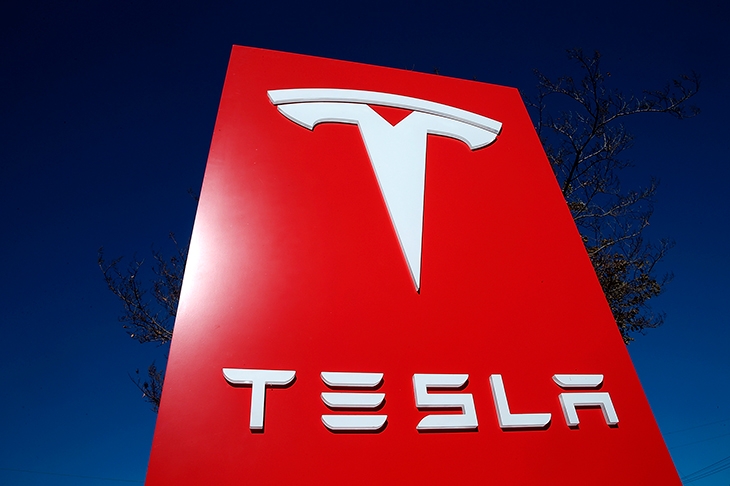Which is madder, bitcoin at $41,500 — oops, make that $31,000 on Monday — or Tesla shares at $880 apiece? Don’t get me started on the crypto-mania in which the Financial Conduct Authority has warned gamblers ‘they should be prepared to lose all their money’. But Tesla, relatively speaking, is a real thing: a California-based carmaker which has expanded the frontiers of the electric vehicle market that’s going to become huge in the next decade and could soon make carbon–fuelled road transport extinct.
Put that way, it’s not so surprising — in tech stock terms — that investors should value Tesla higher than the rest of the US auto industry combined. But those investors are not making an objective calculation based on projected profits or dividend flows. They’re just betting on the self-propulsion of a share that has risen tenfold since March and, while the old economy remains on its knees, may have a way to go yet. In that sense they’re not far removed in mindset from the wackos who are hypnotised by bitcoin. But at least Tesla shareholders are the ultimate owners of a clutch of ‘giga-factories’ and car designs, whereas bitcoiners own nothing but an evanescent idea. If you’re in that zone, ‘Sell bitcoin, buy Tesla’ still looks like a sensible trade.
How to spend it
Tesla’s surge made its maverick founder Elon Musk the richest man in the world when he briefly overtook Jeff Bezos of Amazon, both now sitting on notional fortunes of $180 billion. Conferred as they are on unlovable people by irrational markets, you could say these rewards make capitalism look grotesque. But the benefit, I suggest, is that they don’t appear to buy happiness and are so huge that only a tiny portion can ever be spent on lifestyle — so in the end, they will have to be given away to good causes.
Bill and Melinda Gates, with Warren Buffett, have made global impacts in healthcare through the Gates Foundation. Bezos, after a slow start, has committed $10 billion to climate change action and $2 billion for the homeless. Musk put $250 million worth of Tesla stock into a charitable foundation but is still asking Twitter followers what he should do with it, while tiresomely talking about ‘building a city on Mars’. He should find an earthly cause soon and fund it large: I’ll be happy to forward your suggestions.
Forget Big Bang
A good sub-editor advised me ages ago to avoid the suffix ‘2.0’ to describe a new iteration of anything because ‘it’s already a tired cliché’. So I was sorry to hear the Chancellor waffling about ‘Big Bang 2.0 or whatever’ in a City AM podcast in which he also played down the potential harm to UK financial services from the Brexit trade settlement of which I wrote last week. My own long-term judgment of the first Big Bang — the 1986 reforms that sought to remake London in the image of Wall Street — was that it demolished much of what was good about the City while encouraging excessive risk-taking in increasingly volatile markets. Another round of deregulation aimed at pulling business back from Europe, if that’s what ‘2.0’ might mean, could do the same again. What’s needed instead is a renaissance of the niche specialism, high integrity and fleet footwork that gave the City its global clout in earlier golden days: Big Bang had nothing to do with it.
Sharp wit
The news that the former Goldman Sachs banker Richard Sharp is to succeed Sir David Clementi as chairman of the BBC provoked less hostile reactions in media circles than might have been expected, given that Sharp is also an ally of the Chancellor with a long connection to the Centre for Policy Studies free-market thinktank. But as several commentators pointed out, he’s not Charles Moore (the Prime Minister’s provocative first choice for the job) and his views on the future of the licence fee on which he’ll now lead negotiations with ministers are unknown; furthermore, he’s a generous arts patron and philanthropist.
If BBC folk think they’re in for an easy ride, however, I must warn them that their new boss is as sharp as his name. In 2011 he took part in a Spectator debate on the question: ‘City bonuses: are they deserved or should they be curbed?’ From the chair I invited him to speak first, expecting a balanced defence of the system that had awarded him an estimated £100 million by the time he retired from Goldmans in 2007. Instead, with a mischievous glint, he opened with a head-on attack on me as an ex-City man who had turned, in print, to biting the hands that once fed me. How sneaky was that?
Recipe of the day
Northern Ireland’s supermarket shelves are bare while Europe’s hauliers are hiking freight charges to the UK for fear their trucks will take weeks to get out again. But the saddest Brexit story concerns Scottish fishermen who face sending container-loads of langoustines, scallops, oysters, lobsters and mussels to landfill because long–established next-day delivery lines to continental customers have broken down, defeated by border paperwork and incompatible IT. If problems are not swiftly resolved, some already struggling suppliers won’t survive — not least because the alternative domestic market for their produce is so small.
We just don’t eat enough of these delicacies, but now would be a good time to acquire the taste. Bold entrepreneurs should create a national chain of pop-up stalls, perhaps in temporarily closed restaurants — following the example of one London lunchtime favourite, San Pietro in Stratford Road, whose window now offers (says my Kensington correspondent) ‘a cheering cornucopia of glorious seafood’. And as relief from Chris Whitty, let’s have Rick Stein’s recipe of the day on the end of the Downing Street briefing.







Comments